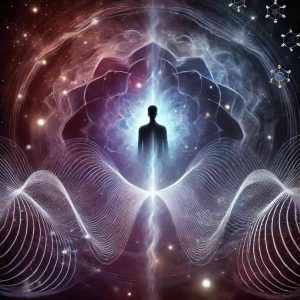
In the article “The Rice Chessboard Problem: A Tale of Exponential Growth“, Jesse Tayler draws a parallel between the exponential growth of rice on a chessboard and the doubling of transistors in modern computers. Tayler suggests that as computational power increases exponentially, the emergence of consciousness in AI systems becomes inevitable.
This view, though intriguing, oversimplifies the profound nature of consciousness. The assumption that consciousness arises purely from increasing the complexity of neural circuits or the number of transistors in a computer overlooks a critical distinction: consciousness is not a byproduct of physical processes. It is the force that shapes the physical Universe.
Consciousness and the Observer Effect
The Copenhagen interpretation of quantum physics suggests that the act of observation plays a crucial role in setting the state of a quantum system. In quantum mechanics, particles exist in a superposition of all possible states until observed. This superposition is described by a mathematical entity known as the “wave function.” When an observer interacts with the system, the wave function “collapses,” forcing the particle to “choose” a specific state from all the possibilities.
This behavior exhibited by the building blocks of our material existence introduces a profound concept: without an observer (consciousness), the Universe remains in a state of pure potentiality, where all possible outcomes are equally real but none are actualized. The conscious observer brings the Universe into a definite, tangible form. This fundamental property of quantum mechanical systems reveals that consciousness shapes physical reality rather than emerges from it.
Implications of Consciousness as the Invisible Hand Behind Reality
Consciousness separate from the physical processes of the Universe has significant implications for both AI development and our understanding of reality. AI, no matter how advanced, can never achieve true consciousness because it operates entirely within the realm of physical processes. This limitation suggests that AI can only mimic aspects of conscious behavior without ever experiencing subjective awareness.
Moreover, this separation implies that consciousness exists on a different plane from the material Universe. It challenges the notion that reality is purely objective and deterministic. It paints an image of consciousness as an external force that interacts with the physical world but does not originate from it. Quantum mechanics tells us that we literally create the reality we see around us.
Despite exponential advances in computing power, AI will never achieve consciousness. The limits quantum mechanics puts on AI’s potential highlight the uniqueness of the human experience. They show that some aspects of reality will remain beyond the reach of artificial systems.
Jayson Adams is a technology entrepreneur, artist, and the award-winning and best-selling author of two science fiction thrillers, Ares and Infernum. You can see more at www.jaysonadams.com.